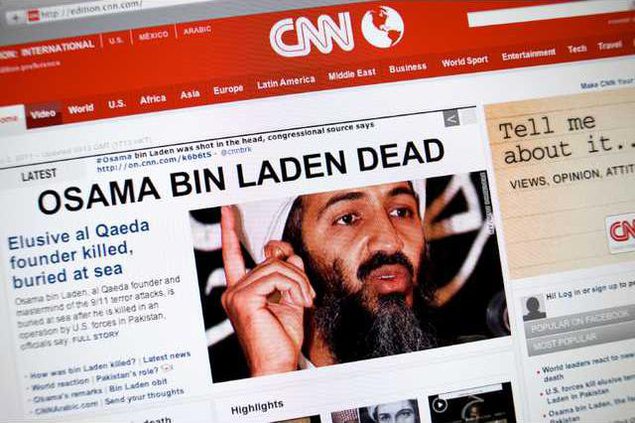A veteran investigative journalist has published an article claiming that the Obama administration's narrative about the mission to kill Osama bin Laden was largely fabricated.
Many media outlets have published outraged articles in response to journalist Seymour Hersh's article in the London Review of Books, calling Hersh's reporting into question given that Hersh employed anonymous sources.
Hersh's article states that bin Laden was killed in 2011 after paying a top Pakistani intelligence officer-turned-informant the $25 million reward offered for the 9/11 mastermind not, as the White House maintains, as a result of a lengthy tracking investigation of couriers around bin Laden's compound. Hersh also alleges that the U.S. Navy SEAL raid of bin Laden's compound was conducted with the cooperation of the Pakistani government and intelligence authorities rather than the lone-wolf mission it was later called.
Hersh's story gained attention over the weekend, with Vox, Slate and the Christian Science Monitor making up part of a chorus of media outlets decrying Hersh's reporting.
"Hersh produces no supporting documents or proof, nor is the authority of either source established," Vox's Max Fisher wrote. "Beyond that, Hersh's proof is that he finds the official story of the Osama bin Laden raid to be unconvincing."
But other journalists, including Glenn Greenwald, have defended Hersh on the grounds that the government's story was too readily accepted as truth.
"There's a direct correlation between a) spewing D.C.'s (conventional wisdom) while breaking no news ever & b) eagerness to mock Sy Hersh," Greenwald tweeted. "Serious skepticism is due for Hersh's story but not the know-it-all mockery of the do-nothing D.C. Kool Kidz."
Nor is Hersh the first journalist to point out inconsistencies in the White House's story of bin Laden's death.
The U.K. Guardian ran an in-depth list of how the administration contradicted itself and later changed elements of the story, including whether or not bin Laden died in an exchange of gunfire and that he used women, including his own wife, as human shields. President Obama later chalked the inconsistencies up to "the fog of war."
The New York Times has also published stories questioning the official narrative in the past.
Yet it's also significant that Hersh's usual stomping grounds, the New Yorker, refused Hersh's piece. In an interview with Slate, New Yorker editor David Remnick tried to walk a difficult line between condemning the piece and explaining why he chose not to publish it.
"There is a difference between what people say loosely or in speeches and what we publish. All I can be in charge of is what we publish," Remnick said. "I have enormous respect (for Hersh)."
Many media outlets have published outraged articles in response to journalist Seymour Hersh's article in the London Review of Books, calling Hersh's reporting into question given that Hersh employed anonymous sources.
Hersh's article states that bin Laden was killed in 2011 after paying a top Pakistani intelligence officer-turned-informant the $25 million reward offered for the 9/11 mastermind not, as the White House maintains, as a result of a lengthy tracking investigation of couriers around bin Laden's compound. Hersh also alleges that the U.S. Navy SEAL raid of bin Laden's compound was conducted with the cooperation of the Pakistani government and intelligence authorities rather than the lone-wolf mission it was later called.
Hersh's story gained attention over the weekend, with Vox, Slate and the Christian Science Monitor making up part of a chorus of media outlets decrying Hersh's reporting.
"Hersh produces no supporting documents or proof, nor is the authority of either source established," Vox's Max Fisher wrote. "Beyond that, Hersh's proof is that he finds the official story of the Osama bin Laden raid to be unconvincing."
But other journalists, including Glenn Greenwald, have defended Hersh on the grounds that the government's story was too readily accepted as truth.
"There's a direct correlation between a) spewing D.C.'s (conventional wisdom) while breaking no news ever & b) eagerness to mock Sy Hersh," Greenwald tweeted. "Serious skepticism is due for Hersh's story but not the know-it-all mockery of the do-nothing D.C. Kool Kidz."
Nor is Hersh the first journalist to point out inconsistencies in the White House's story of bin Laden's death.
The U.K. Guardian ran an in-depth list of how the administration contradicted itself and later changed elements of the story, including whether or not bin Laden died in an exchange of gunfire and that he used women, including his own wife, as human shields. President Obama later chalked the inconsistencies up to "the fog of war."
The New York Times has also published stories questioning the official narrative in the past.
Yet it's also significant that Hersh's usual stomping grounds, the New Yorker, refused Hersh's piece. In an interview with Slate, New Yorker editor David Remnick tried to walk a difficult line between condemning the piece and explaining why he chose not to publish it.
"There is a difference between what people say loosely or in speeches and what we publish. All I can be in charge of is what we publish," Remnick said. "I have enormous respect (for Hersh)."





